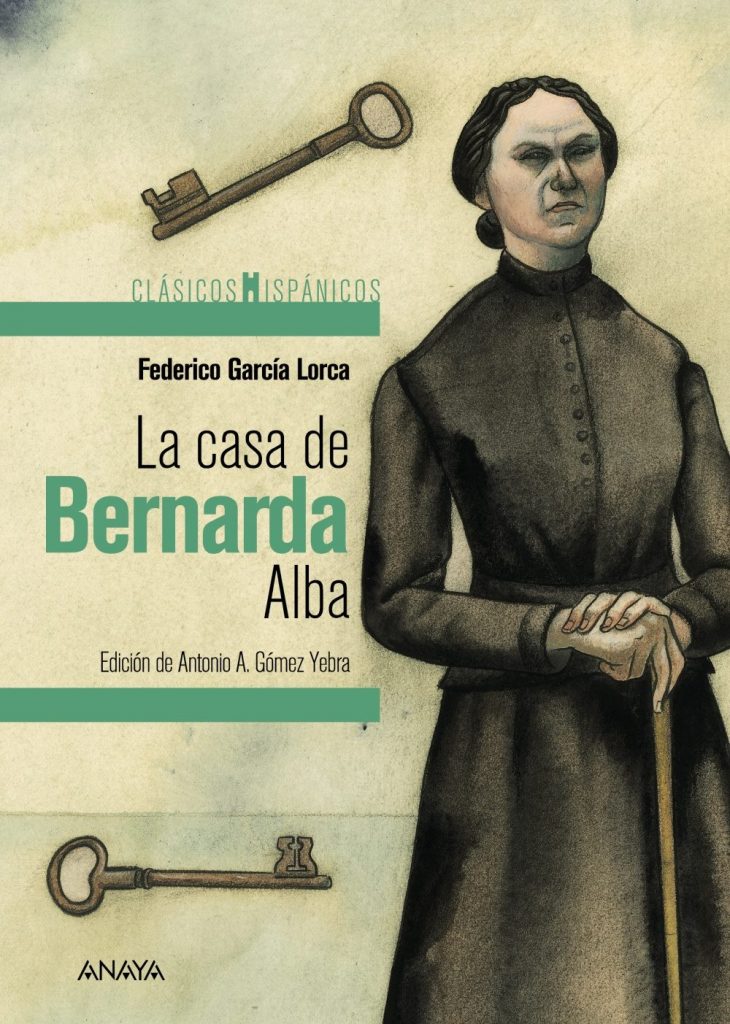La Casa de Bernarda Alba Summary
7 min read ⌚
 A Drama of Women in the Villages of Spain
A Drama of Women in the Villages of Spain
How relevant a book subtitled “a drama of women in the villages of Spain” can be to a sophisticated 21st-century reader?
You’d be surprised.
Federico Garcia Lorca’s “La Casa de Bernarda Alba” will be read and reread until there’s sexual discrimination, bigotry, and the need for #MeToo movements.
Who Should Read “La Casa de Bernarda Alba”? And Why?
“La Casa de Bernarda Alba” – or “The House of Bernarda Alba” in English – is a three-act play written in a time when even in WEIRD societies, women had about as many rights and freedom as dogs and cats.
Things have changed in the meantime – helped by books such as this one – but that doesn’t mean that women have won the war for equality. In fact, they are still unjustly discriminated in about half of the world.
(And even the rest of it isn’t that great.)
“The House of Bernarda Alba” is for men who want to stand for an hour or two in women’s shoes and see how it’s like. It’s also for women who want to rebel.
But, more than everything, it’s for women who are cynical enough to think, like their title character, that tradition gives them the right to further the injustice on their own sex.
Federico Garcia Lorca Biography
Federico Garcia Lorca was a Spanish poet and playwright, one of the most important writers of the 20th century.
was a Spanish poet and playwright, one of the most important writers of the 20th century.
He was a member of the influential literary group “Generation of ‘27” which was the first one to introduce in Spain the avant-garde forms of poetry and art, such as symbolism, surrealism, and futurism. He is usually remembered as “a gypsy poet,” since many of his best-known poems were first published in the appropriately titled “Gypsy Ballads.”
Dubbed “socialist,” “freemason” and “homosexual” by the Franco government, the 38-year-old Lorca was shot by Nationalist militia on August 19, 1936.
His body has never been found.
Plot
Plot is not exactly the right word when it comes to “The House of Bernarda Alba.”
Because, strictly speaking, that’s the least of Lorca’s concerns.
Everything that happens inside this story (sorry: play) happens inside a single house – hence, the title – in a small village in Andalusia, Spain.
And it’s the opposite of “Lord of the Flies,” since here there’s not one single male present. All of the characters are women.
Let’s meet them:
Bernarda Alba, sixty years of age, a widow and the patroness of the house. We chose the word “patroness” carefully, since her name itself means “masculine” and “with a bear’s force.” And – you’ll see – that doesn’t tell half of the story.
La Poncia, her housekeeper, playing the part of Pontius Pilate in a story of female Jesuses.
And they are Bernarda Alba’s five daughters.
Angustias (meaning “the anguishing one”), aged 39, is her oldest child and the only one of her previous marriage. She has inherited a large fortune from her deceased father.
Magdalena (30 years old, another Bible reference), Amelia (27, “industrious”), Martirio (24, “the martyr”), and Adela (20, “the one who goes forward”) are the remaining four.
Their father has just died at the beginning of the play. And he hasn’t left them that much money.
Now, you’d expect that few fatherless/husbandless women with few rooms and some money would know how to take care of themselves and would look out for each other, but that only means that you don’t know Bernarda Alba.
Because she’s to her daughters what Stalin was to the Soviet people. And the Polish. And the Jews. And the Germans.
OK, Stalin was way worse.
But that doesn’t mean that Bernarda Alba isn’t tyrannical.
Just take this as an example of her parenting methods: after the death of the girls’ father (of course, all excepting Angustias), she announces an eight-year-long mourning period.
Not eight days, not even eight weeks.
Eight years.
But, as far as Bernarda Alba is concerned, sitting home all day doing nothing but sewing is not a mourning period, but a woman’s destiny.
Who cares if after eight years some of the girls are too old to get married!
Life shouldn’t be fun for a woman.
And that’s what Bernarda explicitly tells Magdalena in a discussion which feels as if taken from a Medieval manual for torturing women:
MAGDALENA: …I know I’m not going to marry. I’d rather carry sacks to the mill. Anything except sit here day after day in this dark room.
BERNARDA: That’s what a woman is for.
MAGDALENA: Cursed be all women.
BERNARDA: In this house, you’ll do what I order. You can’t run with the story to your father any more. Needle and thread for women. Whiplash and mules for men. That’s the way it has to be for people who have certain obligations.
Now, Magdalena may be obedient (after all, she may even have been closest to their father), but the youngest daughter – it’s always the youngest, isn’t it? – has some fairly different plans.
And when we say “fairly different” we mean that she is barely out of her teenage years! Which means that’ she is not only disinterested in respecting authorities, but she is also pretty keen on defying them publicly.
“I’m thinking that this mourning has caught me at the worst moment of my life for me to bear it,” she says to Magdalena (quite self-interestedly if we may comment). And then, after Magdalena tells her that she’ll get used to it, crying with rage, adds:
I will not get used to it! I can’t be locked up. I don’t want my skin to look like yours. I don’t want my skin’s whiteness lost in these rooms. Tomorrow I’m going to put on my green dress and go walking in the streets. I want to go out!
Don’t blame her too much for being a bit rash.
Adela just wants to be free to enjoy her life!
However, what Adela doesn’t know is that freedom comes with money; and that the fact she doesn’t have them means that the green dress is almost everything she can do to defy her mother at the moment.
Unlike her sister Angustias, who hopes to use her inheritance to entice a marriage proposal from Pepe el Romano, a young man who doesn’t have too much money himself.
Angustias has a subtle way of rebelling herself, putting some makeup on her face which, upon seeing, Bernarda Alba violently brushes away.
Out of nowhere, we learn that there’s another woman in the house, Maria Josefa, Bernarda Alba’s mother.
She rushes onto the scene exclaiming that she wants to marry herself and run away from the house.
Yes, she’s a bit senile and as mad as they can get, but she has a point. Just like Bernarda Alba’s secret desires, she’s also repressed and locked away in a solitary room.
And just like them, when she goes out, she causes uproar and mayhem.
Now, Pepe el Romano must be a catch and a half, since Angustias is not the only one who’s in love with him.
We soon learn from Martirio, a hunchback, that Pepe el Romano stays much too late at their house.
Way after Angustias goes to bed – if you know what we mean.
If not, Pepe goes to bed too.
Adela’s.
To make matters worse, Angustias announces that the photo of Pepe she keeps under her pillow has been stolen.
You’d think it’s Adela at this point.
But no – it’s Martirio!
So, a quick recap:
Angustias has money and wants to use it to allure into marriage the poor Pepe el Romano, who actually likes – and sleeps with – Adela, an affair known by Martirio, who is platonically in love with Pepe.
And all this in a house ruled by a widow who wants her daughters to mourn their father for about a decade!
Now, that’s what we call a serious problem.
One that spells tragedy all over the place.
La Casa de Bernarda Alba Epilogue
And that’s the final, third act of the play.
Angustias and Pepe are now engaged, but he and Adela are still having an affair.
One night, Martirio notices that Adela sneaks outside of the house and starts following her. She’s interrupted by Maria Josefa holding a lamb and singing a song. By the time they manage to put her back into her room, Adela reenters the house.
And it’s fairly obvious where she has been and what she has been doing. Martirio starts a quarrel, and everyone comes out.
Bernarda Alba would have none of it!
She takes a shotgun and runs off to shoot Pepe. Martirio follows. A shot is heard, after which Bernarda Alba and Martirio come back and tell the girls that Pepe is dead.
Adela flees in distress into her room.
Bernarda Alba uses her absence to tell the rest that she didn’t actually kill Pepe – her aim, she says, is poor, on account of (what else?) her womanhood.
(Back in the 1930s, they apparently didn’t have movies such as “Tomb Raider” or “Wonder Woman.”)
Whew – tragedy averted!
Don’t get your hopes too high!
A sound is heard from Adela’s room, and when Bernarda Alba enters, she sees that Adela, our modern Juliet, has hanged herself.
Bernarda shows remorse for only a brief moment in time.
After that, she’s back to her usual best: she demands that the whole town knows that Adela has died a virgin.
Even though she most certainly has not.
Like this summary? We’d like to invite you to download our free 12 min app, for more amazing summaries and audiobooks.
“La Casa de Bernarda Alba PDF Quotes”
MARTIRIO: History repeats itself. I can see that everything is a terrible repetition. Share on X PONCIA: You aren't married but it's good for you to know, anyway, that two weeks after the wedding a man gives up the bed for the table, then the table for the tavern, and the woman who doesn't like it can just rot, weeping in a corner. Share on X BERNARDA ALBA: I have five chains for you, and this house my father built, so not even the weeds will know of my desolation. Share on X BERNARDA ALBA: Let whoever loses her decency pay for it. Share on X MARIA JOSEFA: Pepe el Romano is a giant. All of you love him. But he's going to devour you because you're grains of wheat. No, not grains of wheat. Frogs with no tongues! Share on XOur Critical Review
“The House of Bernarda Alba” is neither a very long book nor one you would have any trouble reading. The atmosphere makes the reading not only a worthwhile, but also a breathtaking and thrilling experience.
In fact, you’d be surprised to see how much sexual tension can be packed in a single house and amongst few women talking with each other.
Which brings us to the language of the play. It’s so lyrical and rhythmical that it makes some of its lines as memorable as if taken out from a great poem.
Emir is the Head of Marketing at 12min. In his spare time, he loves to meditate and play soccer.


 A Drama of Women in the Villages of Spain
A Drama of Women in the Villages of Spain




